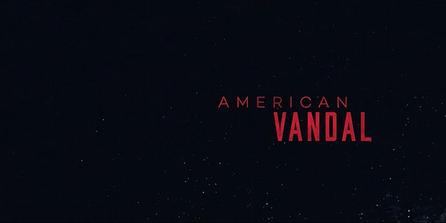While summer blockbusters are usually based around intense action and overwhelming special effects, some of the most popular movies of all time have been about a more mundane subject matter: high school. From “Dazed and Confused’s” depiction of burnt out teenagers in the late ‘70s, to “The Breakfast Club’s” critique on social cliques in 1985, high school hallways have long been a part of American cinema. Even though most of us look back on these years with embarrassment and cringe, we unapologetically love seeing high school depicted on screen.
Few films or TV shows have been able to capture the essence of youth while still providing meaningful commentary and humor as “American Vandal,” a Netflix series that premiered in September 2017. “American Vandal” is a mockumentary that follows Dylan Maxwell (Jimmy Tatro), a 17-year-old “class clown” who is accused of vandalizing 27 cars in his school’s faculty parking lot; more specifically, he is accused of spray painting penises on the cars. Fellow students Peter Maldonado (Tyler Alvarez) and Sam Ecklund (Griffin Gluck) are skeptical of the evidence against Dylan, and produce an eight-episode investigative documentary aimed at proving Dylan’s innocence and revealing the real culprit.
If not for the constant references to male genitalia, or side-investigations into the love affairs of students at the fictional Hanover High School, “American Vandal” would be indistinguishable from “Serial,” a true crime podcast from the creators of “This American Life” that re-investigates a murder case from 1999. For all of the show’s facetiousness and light-heartedness, it also portrays a genuinely good investigation — however satirical.
To find out whether or not Dylan “did the dicks,” Peter and Sam begin interviewing the members of Hanover High School, starting with the prosecution’s key witness: Alex Trimboli. Cross-examinations quickly reveal holes in Alex’s testimony, and Snapchat footage from a party undermines his credibility (he lied about drinking 11 beers). At this point, Peter and Sam work backwards to determine who would have the motive — and ability — to commit the vandalism. They develop a list of suspects based on who would have access to the school’s surveillance footage, because footage was deleted at the time of the vandalism. Through a dynamic and deductive process, they chase down and follow up on leads in the same way a good journalist would.
“American Vandal” accurately portrays high school life and brings feelings of nostalgia to anyone who is just growing out of youth and into adulthood. Dylan Maxwell is a relatable character, a goof-off who is more concerned with pulling public pranks for his YouTube channel than applying for college. Dylan’s friends, the “Wayback Boys,” who celebrate school suspension with “breakfast burritos and blunts,” are a hilarious parody of high school stoners. Peter and Sam’s obsession with personal details of their fellow classmate’s lives is a perfect example of the superfluous gossip that takes place at middle schools and high schools everywhere. The show’s producers, Dan Perrault and Tony Yacenda, know that even though the world is filled with real stories that need to be investigated, there is also a fundamental need for laughter, which can be found in parody.
The reason movies and television shows depicting high school are so popular is because they remind us of our innocence and ignorance. In the chaotic and, often times, ugly world we live in, there is something therapeutic in imitating the mindset of a high schooler (or a parody of a high schooler) who’s biggest concern isn’t paying rent or finding a compatible life partner, but figuring out who spray painted dicks in the school parking lot.

















